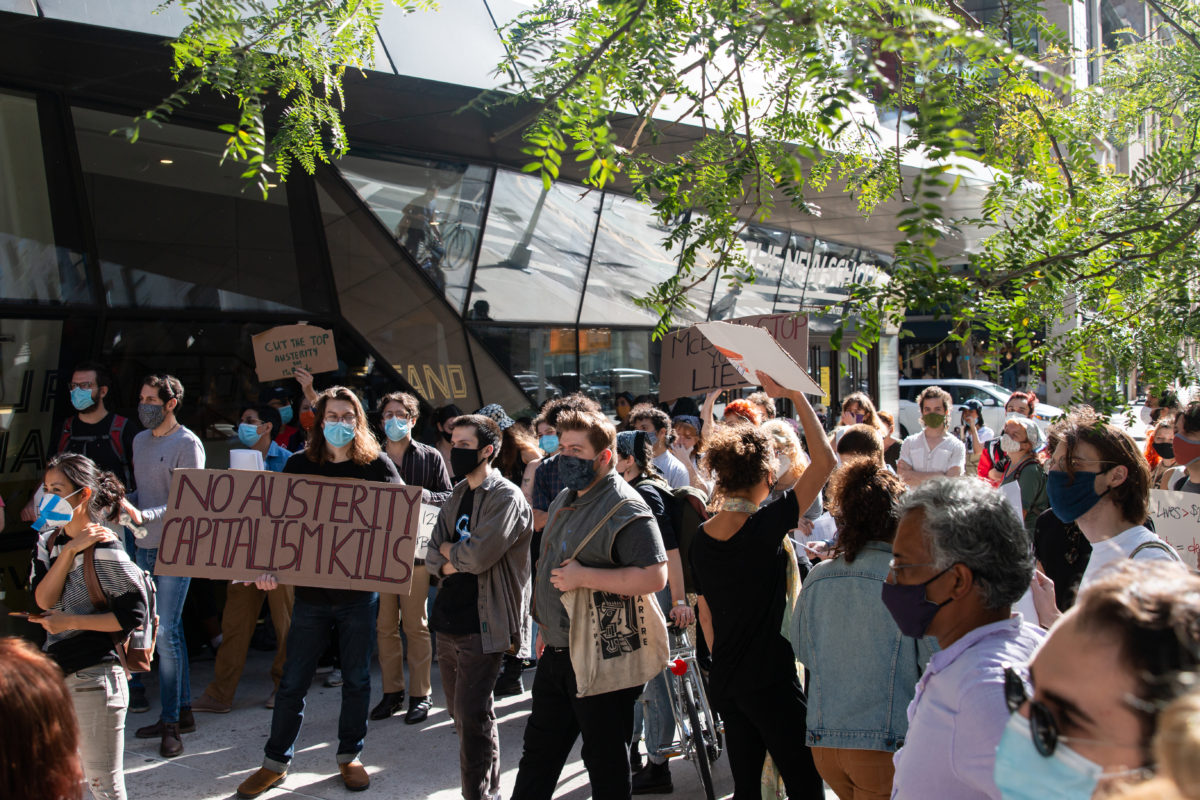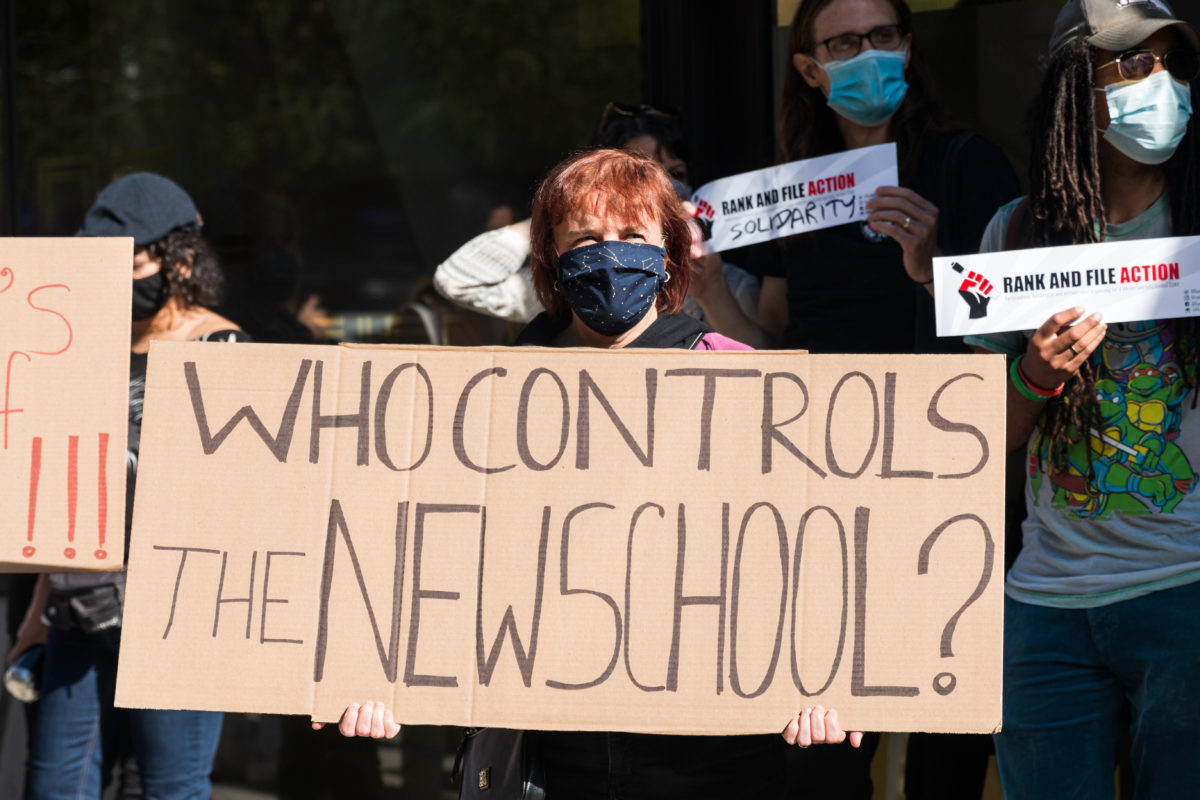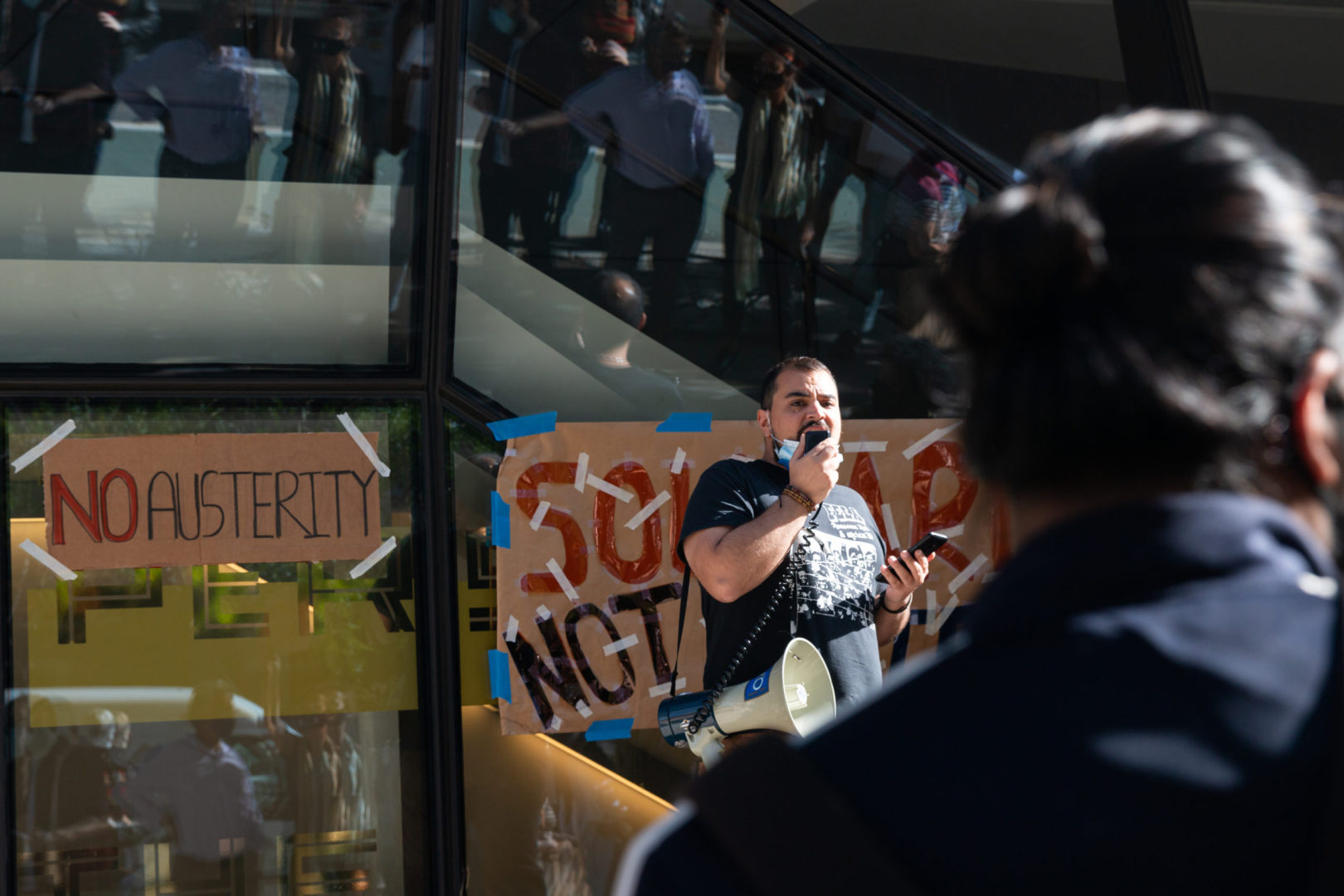In the theme of “Solidarity Not Austerity,” The Economics Student Union at The New School of Social Research led a rally outside the University Center on October 15, demanding the reversal of the recent layoffs, inclusion of labor representatives in decision making at the university, and to “end austerity in higher ed,” according to a poster of the event circulated on social media. A crowd of about 80 people joined the organizers, including students, staff, faculty and alumni.
Under the constraints set by the ongoing pandemic, all participants were asked to wear masks as suggested by the poster created for this event citing “THIS IS A SOCIALLY DISTANT EVENT! BRING MASKS!”, unlike the in-person strikes that took place at The New School before the pandemic.
The organizing effort began as soon as the layoff decision was announced. Kurt Semm, a PhD student in Economics at NSSR and one of the organizers of the event, gathered about 15 people that were in New York and were willing to help organize, and held meetings everyday over Zoom.
“I think the hardest part has just been how do you do this during coronavirus.We are all here risking our lives,” said Semm. “But the outpour of support we’ve gotten is just really great.” He mentioned that even people who could not physically support the demonstration have shown solidarity by reaching out to ask how they could help online through social media.

Representatives from the New School Labor Coalition also made an appearance at the rally. The New School Labor Coalition is comprised of part time faculty union ACT-AUW, academic student workers union SENS-UAW, part-time jazz faculty union AFM Local 802, full time faculty union AAUP-TNS, as well as clerical, administrative, technical, library and professional staff union Teamsters Local 1205, and Student Health Center Employees. According to a petition started by The New School Labor Coalition, the group represents a majority of workers at TNS and 80% of faculty, according to TNSLC.
Speakers at the event included Daniel Younessi, a PhD student in Economics at NSSR, Nelson Nuñez, a union representative for Teamsters local 1205, Sanjay Reddy, an economics professor at The New School who recently published an op-ed in the Free Press, and representatives from student unions at CUNY and Columbia University.
Boyda Johnstone, Assistant Professor of English Literature at Borough of Manhattan Community College, drew similarities between the layoffs at The New School to what is happening at CUNY. According to Johnstone, in the Spring semester of 2020, the pandemic resulted in the layoff of 2,800 adjunct professors and staff.
“The union didn’t do what it needed to do to fight for those jobs back and we are seeing more cuts on the horizon,” said Johnstone.
Tristan Dupuy, a PhD student in Sustainable Development at Columbia University, expressed his solidarity on behalf of his union, GWC-UAW Local 2110 with The New School. In a speech, he spoke about how Columbia University failed to lower rent while having enough money to build new campuses.
“Our 10-billion-dollars institution could not find any money to lower the cuts during the pandemic,” said Dupuy, “It still found a way to lowkey put some people out of their plans because they could not pay their rents.” Dupuy also said that Columbia University still managed to find money and build new campuses and offices in Harlem.
“This is the culmination of a five-year plan to get rid of the less profitable divisions of this university,” said Younessi, the Economics student at NSSR, in an address to the crowd. “They’re getting rid of our essential workers, they’re getting rid of Silvina, our department secretary.” Younessi gestured to Silvina Palacio, a former senior secretary of the economics department at NSSR. Palacio was recently laid-off and participated in a virtual teach in on October 6. Palacio held a sign reading “WHO CONTROLS THE NEW SCHOOL?”

A literary studies student at the New School who attended the protest, Emma Jones, said she attended because “the New School has been just awful.” Jones said she “hope[s] to see the New School Labor Coalition get to come to the table in negotiations” and “at least acknowledge” the plan put forward by Sanjay Reddy, an economics professor at NSSR.
In a speech later on in the afternoon, Reddy again stressed the rejection of austerity policies and the idea that “there is no alternative” to staff layoffs.
“There are so many alternatives,” Reddy said later in an interview. In the 1960’s, during an economic crisis at the school, the president demanded “sizable donations” from trustees on an emergency basis, according to Judith Friedlander’s book A Light in Dark Times: The New School for Social Research and Its University in Exile.
Reddy likened this to what’s called a “bail in.” According to a summary on the impact of COVID on the financial aspect of The New School, the university considered this, but deemed it “not possible in the short term”.
“Have they looked at refinancing the debt to take advantage of the historically low interest rates?” he asked. “The New School spends 20 to 25 million dollars a year on interest charges alone, that could be reduced by probably 10 million dollars.”
Reddy also brought up the idea of an emergency fundraising drive, in addition to other forms of “burden-sharing in which there were more sizable cuts at the top.” He described the idea of temporary pay cuts, as seen in the private sector at General Motors. According to a blog post made by The New School, they instituted “temporary, tiered salary reductions” in the 0% to 15% range.
He also urged the administration to be more transparent in their decision making. “We haven’t been made privy to any of these discussions,” said Reddy.
Reddy restated a point from his recent op-ed: “Its not at all clear The New School has a long term crisis. It has a short term crisis.”
Reddy brought up the New Schools political machinations. We know that in certain years The New School has spent a half million dollars or more on lobbying in Washington. Are they lobbying for a federal bailout of schools? We don’t know.”

In the summary provided by The New School, the university identified itself as a “tuition-driven institution,” meaning that it is dependent on the “enrollment cycle from year to year.”
The impact of COVID-19 was unprecedented and exposed the vulnerability of the university’s financial model. The university experienced a shortfall in student enrollment along with a proportion of students choosing to study part-time. While the university instituted a tuition-freeze this academic year and is offering increased financial assistance, it also has to maintain the campus and its safety through unbudgeted costs. An approximation of five million dollars was spent in unplanned expenses according to the summary.
With all the measures taken by the university such as the non-essential hiring freeze, drawing from endowments, reduction of staff and more, the university anticipated that a balanced budget is not returning until the fiscal year of 2022. The university is not planning on any more layoffs and it is making an effort to “manage costs and grow non-tuition revenue” for a firmer financial footing for the university.
Followed by the demonstration outside the University Center, demonstrators collectively marched to 12th Street and around The New School campus, including past such as Eugene Lang College of Liberal Arts and chanted their messages. The demonstrators eventually returned to the University Center.
Ramona Moorhead, a MA student in economics and a student representative at Economics Student Union, was happy with the turnout of the protest, citing “a great undergraduate turnout.”
Semm added, “The administration’s actions left us very hurt and we really were wondering what is the community at The New School about, and today really justified that we are about social justice, about coming together and caring about people who are part of the makeup of the university.”
When asked for comment on the event, the New School provided the following statement:
“The New School has a long and storied history of supporting free speech and intellectual exchange, and we respect our community’s right to express their points of view. We also respect and deeply appreciate all of the faculty, staff, and students who work to make The New School such a remarkable institution.
We are proud of our relationships with labor unions representing eight different employee groups, including our part-time faculty, a large number of our staff, and student academic employees. Our earliest labor union relationship dates back approximately 50 years, and, more recently, we were among the first universities in the country to recognize student workers as a collective bargaining unit. The employees represented by the various labor unions at The New School are valued members of our community, and we will continue to honor the contractual relationships with each of our unions with respect to how we communicate, how we work together, and how we address issues and concerns.
The New School has been transparent about the need to take significant steps to put the institution on firmer financial footing and to enable it to thrive in a new, more challenging environment for higher education. Since April, the university’s leadership has been engaged in planning work to thoughtfully assess the challenges facing the institution and to determine the financial and structural changes needed to further its academic mission and ensure The New School remains strong and resilient. Our decision-making was guided by The New School’s values of equity, inclusion, and social justice, and with input from faculty, staff, and student leaders across our campus.”
We encourage all members of our community to learn more about the impact of COVID-19 on university finances and enrollment in the summary available here.”
Moorhead spoke about potential future actions and said that “In the future, we just like to get the message out to everyone in terms of what’s going on.” She said that she hoped to make students’ voices heard and to “have a seat at the bargaining table.”







